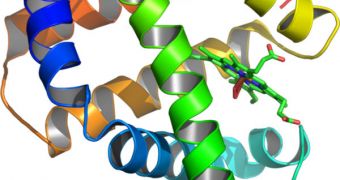Researchers studying Alzheimer's Disease (AD) say that, while numerous causes contribute to the development of this neurodegenerative disease, the misfolding of proteins in the human brain is the root issue that allows the brain to lose its cognitive abilities.
Proteins that are folded incorrectly tend to accumulate in the brain, hampering its function, and causing people to lose their memory, become confused, and experience reduced cognitive abilities.
At this point, official statistics shows that AD is the most common form of dementia. It can also share its “host”with Parkinson's Disease (PD), resulting in a condition called Lewi Body Disease (DLB).
Studies conducted thus far have demonstrated that both genetic and hereditary factors are involved in the early onset and development of Alzheimer's. But many of these factors in fact hamper proteins.
Using these data as a background, investigators at the US Department of Energy's (DOE) Lawrence Berkeley National Laboratory (Berkeley Lab) have developed a new method of accurately detecting misfolded proteins in biological fluids.
This highly sensitive approach utilizes nanotechnology to make its detection, and holds the promise of allowing healthcare experts to finally discover symptoms pertaining to AD early on, when medication can still be effective.
In the end, the new achievement could help experts create new therapeutic approaches to addressing this disorder. The incidence of Alzheimer's is expected to increase in the developed world, as the general population ages.
“This collaboration illustrates how a biomedical problem can also be a nanoscience problem, in which a chemical reagent is needed to recognize partially aggregated proteins,” Ron Zuckermann explains.
“We were faced with the challenge of synthesizing a material that’s capable of specifically detecting this aggregated protein and not any of the other proteins in the blood,” the expert goes on to say.
Zuckermann holds an appointment at the Berkeley Lab Molecular Foundry's Biological Nanostructures Facility, which is the nanoscience user facility at the labs. He adds that the work is based on discovering which proteins are not folded properly.
The way in which these molecules fold determines their function. As such, when folding patterns are incorrect, the protein begins to display unusual behaviors, producing other effects than those it's supposed to, scientists say.
“Peptoids are ideal for this application as they are similar to proteins in structure, but different enough that they aren’t degraded by enzymes in the blood. We can now engineer materials that are capable of specific recognition yet can evade destruction,” Zuckermann says of the synthetic polymers the team uses.

 14 DAY TRIAL //
14 DAY TRIAL //